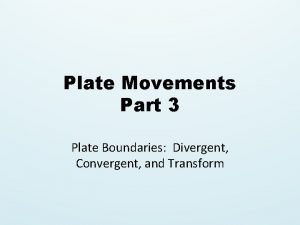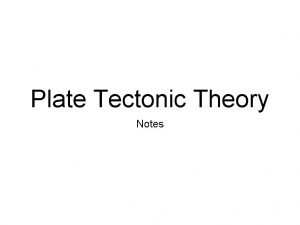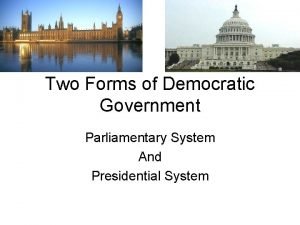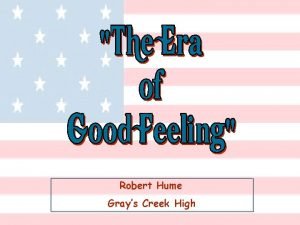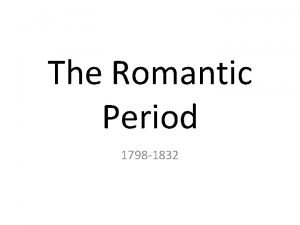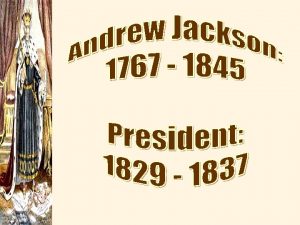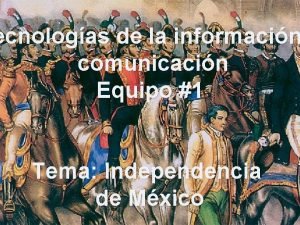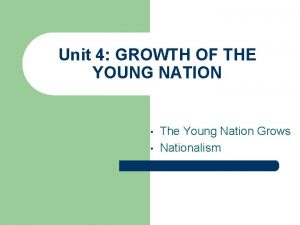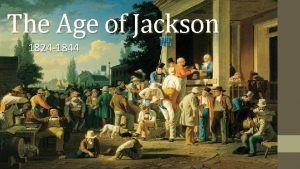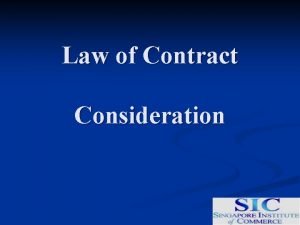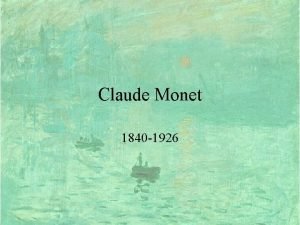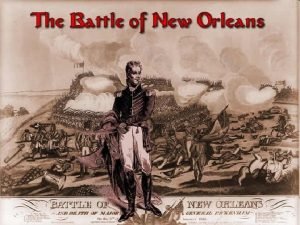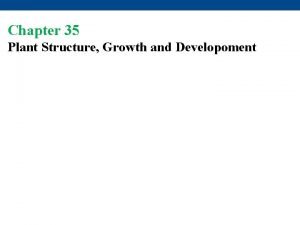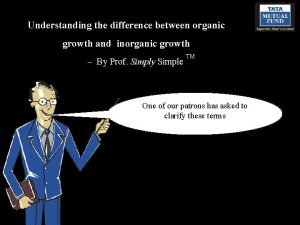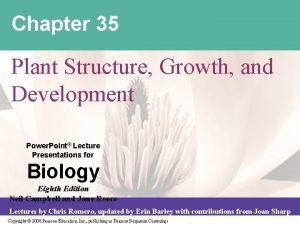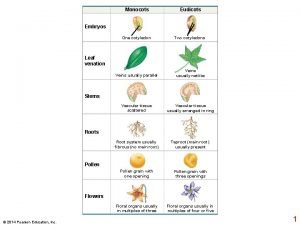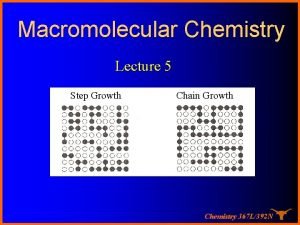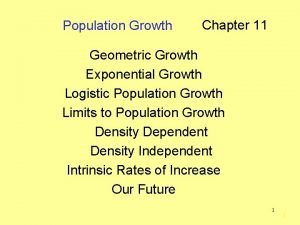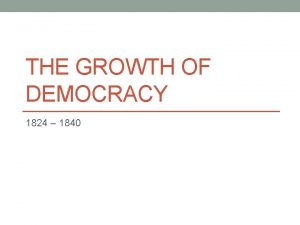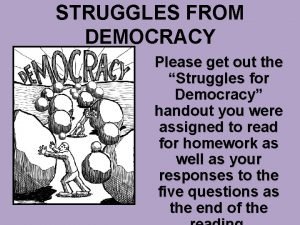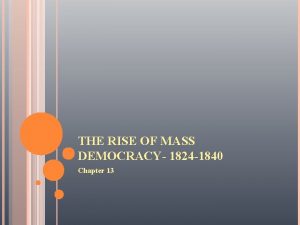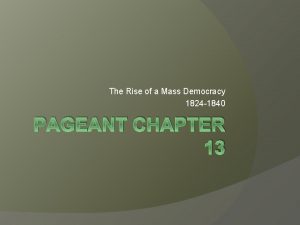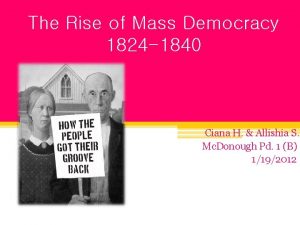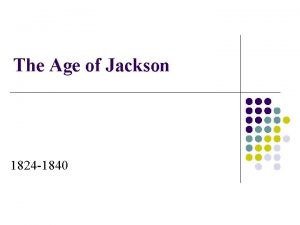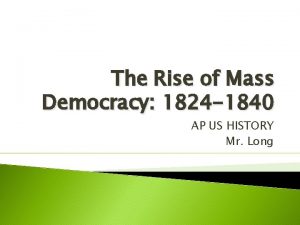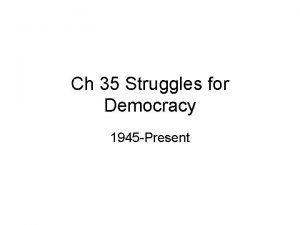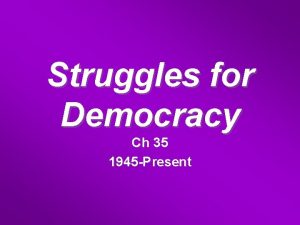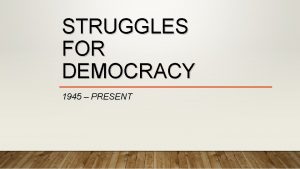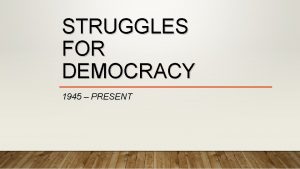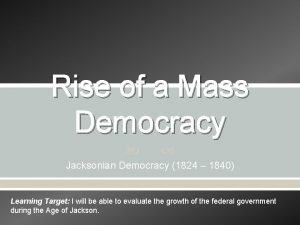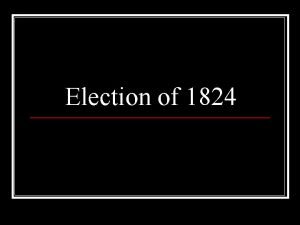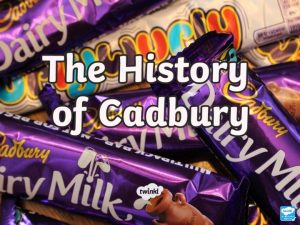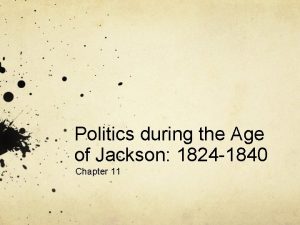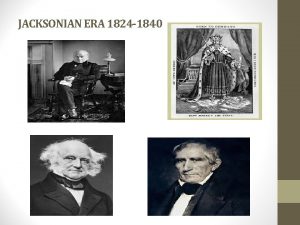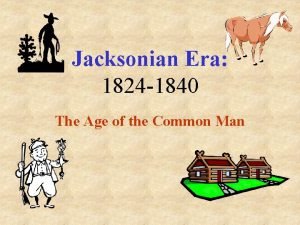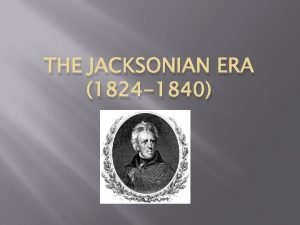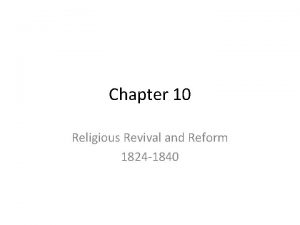THE GROWTH OF DEMOCRACY 1824 1840 Continental Struggles


































- Slides: 34

THE GROWTH OF DEMOCRACY 1824 – 1840

Continental Struggles over Popular Rights • 1821: Mexico wins its independence from Spain; their 1824 constitution mirrored the US constitution, though it gave more power to the president and Catholic Church; Santa Anna emerged as the strongest early president who assumed dictatorial powers • Haitian independence had destroyed the sugar industry, influencing the British Caribbean to revolt, leading to the British abolition of slavery in 1834 (these events were closely watched by the American South) • 1837: Canada revolts leading to the union of both Upper and Lower Canada, making the French speaking population a distinct minority

The Expansion and Limits of Suffrage • In 1800, only white male property owners could vote in most states • As western states came into the Union, suffrage expanded • By the 1820 s, most older states had dropped the property qualifications • By 1840, 90% of adult white males could vote • Women and African Americans were excluded

The Election of 1824 • Thus ends the Era of Good Feelings as 5 candidates ran for president: JQ Adams, John C. Calhoun, Henry Clay, Andrew Jackson, and William Crawford • Jackson won the popular vote and the electoral vote, but not a majority, sending the vote to the House • Clay (the Speaker) backs Adams; JQ Adams is elected; Clay is made Sec. of State; Jackson’s party cries “corrupt bargain” and the hostility of this election blocks most of Adams’s initiatives


The New Popular Democratic Culture • Expansion of franchise: opposition to property qualifications and demands for Universal Male Suffrage led to a more popular form of politics • New state organizations increased their political participation to help Jackson win the presidency: mass campaigning • The print revolution was most evident in the growth of newspapers that helped democratize politics by publicizing the new political theater • Tightly organized, broad-based political groups emerged as party loyalty among politicians and the public was stressed, becoming a part of everyday life

Democracy in Action: Stump Speaking

The Election of 1828 • Jackson won a landslide victory in one of the most nasty, mudslinging campaigns in history • Jackson’s election was a victory for the “common man” that showed the strength of the new popular democratic culture and system of national parties made up of a coalition of North, South and West (no longer regional)


Example of Anti-Jackson propaganda that accuses the general of the murder of three soldiers during the War of 1812

The Age of Jackson: 1829 – 1837 • Jackson symbolized the personal advancement that the frontier offered • His inauguration brought out a mob that ransacked the White House (forcing Jackson to slip out and spend the night at a hotel) • Jackson’s agenda would redefine the president’s role, as well as be one of the most controversial: • Total Indian Removal east of the Mississippi • Stop abuses of the federal government in regards to internal improvements • Oppose and dissolve the National Bank

The mob scene outside the White House

A wheel of cheese and drinks were rolled outside to lure the mob from the White House.

Jackson slashed in the face during the Revolution for not shining an officer’s boots. He’d carry that scar with pride—and it served as a part of his “folk image. ”

Frontier gentleman Statesman General and hero

A Strong Executive • Jackson “redefined” the boundaries of presidential powers as he used the veto more times than the previous 6 presidents combined—forcing Congress to consider his opinions first when making legislation • Jackson’s “negative activism” restricted federal activity, in contrast to the nationalistic administrations of Monroe and Adams before • Appointed his friends and backers in key political positions (the spoils system) and rarely consulted his actual Cabinet —relying on his “Kitchen Cabinet” (his Western buddies) • Jackson’s overwhelming popularity made this possible

Jackson as a Nationalist • Despite his Western background, Jackson created a national coalition, and believed the president to represent the popular will of the people, and thus dominate government • Jackson was able to override sectional interests due again to his national appeal—but many crises lay ahead • Yet, he had to face severe sectional opposition by some of the most distinguished statesmen in US history: • Henry Clay of KY: Speaker of the House 1811 -1825; the “Great Compromiser” represented the West, internal improvements, national bank, and a national economic policy; but Jackson hated this man with a passion due to the “corrupt bargain” • Daniel Webster: senator from Mass. ; probably the best orator of the day; represented the North’s commercial interests, protective tariffs, national bank, and strong federal govt. • John C. Calhoun of SC: the VP who represented Southern interests, states’ rights, the expansion and preservation of slavery; Calhoun would leave the VP position and be the champion for the Southern cause

• n The next generation of American statesmen: Calhoun, Clay, and Webster (clockwise)

The Nullification Crisis • 1828: The “Tariff of Abominations” produced a strong reaction from • • • SC: the South argued that the overly high tariff was an unconstitutional effort to enrich the North at the South’s expense VP to be Calhoun wrote an anonymous defense of the doctrine of nullification claiming that states could refuse to enforce laws they felt unconstitutional Jackson and Calhoun clashed and Calhoun resigned as VP two years into the term; and became a senator for SC, and the South’s mouthpiece 1832: Another high tariff is passed (despite Jackson’s disproval) and SC threatens to secede Jackson sees this as treason and passes the Force Bill, which allows the use of force to collect the taxes if necessary Henry Clay works out a compromise (Tariff Act of 1833) that lowered the tariff rate, as SC rescinded their nullification decree: avoiding Civil War

Indian Removal • Jackson changed American Indian policy from assimilation to removal • The Five Civilized Tribes were most affected (Cherokees, Chickasaws, Choctaws, • • Creeks, and Seminoles) Jackson pressured the removal of the Cherokee from Georgia, issuing the Indian Removal Act that allowed states to override federal protection of Native Americans and remove them from their land (use of force, if necessary)—passed by 3 votes The Cherokee sue: Cherokee v. Georgia and Worcester v. Georgia (1831 -2): Chief Justice John Marshall rules in favor of the Cherokee Jackson defies the Supreme Court: “Let them enforce it. ” Cherokees are removed and forcibly marched along the Trail of Tears to Oklahoma territory (1/4 died along the way) The Black Hawk War (1832): unsuccessful attempt of Indians to reclaim tribal grounds in Illinois By the end of the 1830 s, the last of the remaining Indian tribes east of the Mississippi were removed Created a minor sectional rift: the North protested (mainly from Church groups and other groups that favored assimilation); but it was a lost cause Many of the protesters would now turn towards abolition


Internal Improvements • Jackson argued that federal funding for infrastructure and internal improvements was unconstitutional • Without federal funding the initiatives passed to private developers who then passed it to the states • The states provided more funding for roads, canals, and railroads than the federal government

Legal Support for Private Enterprise • The Supreme Court fostered economic growth with a few landmark decisions headed by Chief Justice John Marshall: • Dartmouth College v. Woodward (1819): prevented states from interfering in contracts • Gibbons v. Ogden (1824): established the federal government’s control over interstate commerce This encouraged economic competition by denying monopolies; state laws enabled businesses to protect themselves by granting charters of incorporation

The Bank War • The Second Bank of the US was chartered in 1816 and was a quasi-private institution • The National Bank acted as a currency stabilizer that encouraged the growth of strong and stable financial interests and curbed the less stable and irresponsible ones from forming • Eastern merchants found the Bank useful • Western farmers and speculators feared that the Bank represented the moneyed elite • Clay and Webster passed an early re-chartering of the Bank through Congress but Jackson vetoed it, strongly

Jackson’s Reelection • Clay misplayed Jackson’s popularity and was soundly defeated • • (he hoped the Bank ordeal would convince Americans to turn on Jackson) Jackson claimed himself the direct representative of the people and could act regardless of Congressional opinion and went ahead and took out all $10 million of federal deposits and placed them in his state-favored “pet banks” Was this an impeachable offense? Abuse of power? Probably. Jackson’s actions marked the end of the American System, and ushered in a new form of laissez-faire economic policy where decision making rests with commercial interests, not with government The Bank War directly inspired Jackson’s opponents to create a new party, the Whigs, solidifying America’s two-party system

The Bank collapses under Jackson’s decree

Whigs, Van Buren & the Election of 1836 • Bank president Nicholas Biddle called in commercial loans, which caused a sharp panic & recession in 1833 -4 • Unhappy with Jackson, merchants, businessmen, southern planters formed a loose alliance and created the Whig Party • Nominated WH Harrison (among other sectional candidates) • Lost to Martin Van Buren (Jackson’s VP)

The Panic of 1837 • The death of the Bank combined with a wild speculative boom • Many new state banks were eager to give out loans, the price of • • • cotton spiked, and speculation of western lands was “feverish” A surplus of $37 million was distributed to the states causing rapid inflation Jackson was alarmed by this runaway inflation and the use of paper money The Specie Circular: Proclamation that the government would only accept payment for public lands in hard currency (gold/silver) Britain demands payment on their loans (draining our specie reserve) Banking system collapses as banks refuse to pay out of their deposits The Panic of 1837 lasted 6 years, the worst economic downtime thus far, as the depression resulted in widespread hardships

The Second American Party System Democrats • Spoke for the principles of Jeffersonian democracy, expansion, the freedom of the “common man” from government and financial monopolies • Power base and support came from the rural South and West, some Northern urban workers • Majority party 1828 -1860 Whigs • “Heirs” to Federalism favoring a strong role of the national government in the economy (promoted the American system) and supported active social reform • Formed in opposition to the policies of “King Andrew” • Power base lay in the North and Old Northwest: those that benefited from increased commercialization, urban merchants, and some southern planters • Won presidential elections of 1840 and 1848

The Campaign of 1840 • The Whigs ran William Henry Harrison portraying him as a humble Jackson-esque figure (war hero of 1812, killer of Tecumseh, and winner at Tippecanoe); while portraying Van Buren as an aristocrat • They ran John Tyler from Virginia as VP to attract the southern vote • Log cabins and hard cider: songs, grass-roots styled, raucous election campaign (combined with utter disgust of Van Buren) led to a sweeping Whig victory with an 80% voter turnout • Tippecanoe and Tyler, too! (Honestly how could you NOT vote for this guy? BBQ and unlimited jugs of hard cider…)



Whig Victory Turns to Loss • Harrison died a month after being inaugurated and John Tyler assumed office (“His Accidency”) • Tyler was a former Democrat who clashed with the Whig Congress vetoing a series of bills that called for a new National Bank, tariffs, and internal improvements • Tyler’s presidency was a four-year stalemate (I couldn’t resist this, sorry)

Popular Cultures and the Spread of the Written Word • The “print revolution” had far reaching effects beyond politics • Newspapers and almanacs fostered popular culture • Washington Irving, James Fenimore Cooper, and Ralph Waldo Emerson created a distinctly American culture focusing on frontier expansion, the “American Scholar, ” and everyday life: “the familiar, the low”
 Convergent continental continental features
Convergent continental continental features Convergent continental boundary
Convergent continental boundary Definition of presidential form of government
Definition of presidential form of government Hume foreclosures
Hume foreclosures Constituição 1824
Constituição 1824 The age of jackson 1824-1844
The age of jackson 1824-1844 Romantic period 1798 to 1832
Romantic period 1798 to 1832 Was andrew jackson a president
Was andrew jackson a president The romantic age (1798 to 1824)
The romantic age (1798 to 1824) Moses austin symbol
Moses austin symbol Select all the accenture delivery tools
Select all the accenture delivery tools Avolida
Avolida Martin van buren political party
Martin van buren political party Guided reading & analysis: the age of jackson, 1824-1844
Guided reading & analysis: the age of jackson, 1824-1844 Mexican constitution of 1824
Mexican constitution of 1824 Conflict or struggle
Conflict or struggle Define productive struggles
Define productive struggles Chapter 14 section 3 hoover struggles with the depression
Chapter 14 section 3 hoover struggles with the depression Define productive struggles
Define productive struggles Hartley v ponsonby
Hartley v ponsonby Claude monet 1840 1926
Claude monet 1840 1926 Liebig 1840
Liebig 1840 We took a little trip down the mighty mississippi
We took a little trip down the mighty mississippi Segundo reinado 1840 a 1889
Segundo reinado 1840 a 1889 Voto censitário
Voto censitário Fue descubierto y nombrado por schoenbein en 1840
Fue descubierto y nombrado por schoenbein en 1840 Primary growth and secondary growth in plants
Primary growth and secondary growth in plants Neoclassical growth theory vs. endogenous growth theory
Neoclassical growth theory vs. endogenous growth theory Absolute growth rate and relative growth rate
Absolute growth rate and relative growth rate Difference between organic and inorganic growth
Difference between organic and inorganic growth Vascular ray
Vascular ray Shoot system
Shoot system Growthchain
Growthchain Geometric growth graph
Geometric growth graph Phối cảnh
Phối cảnh
